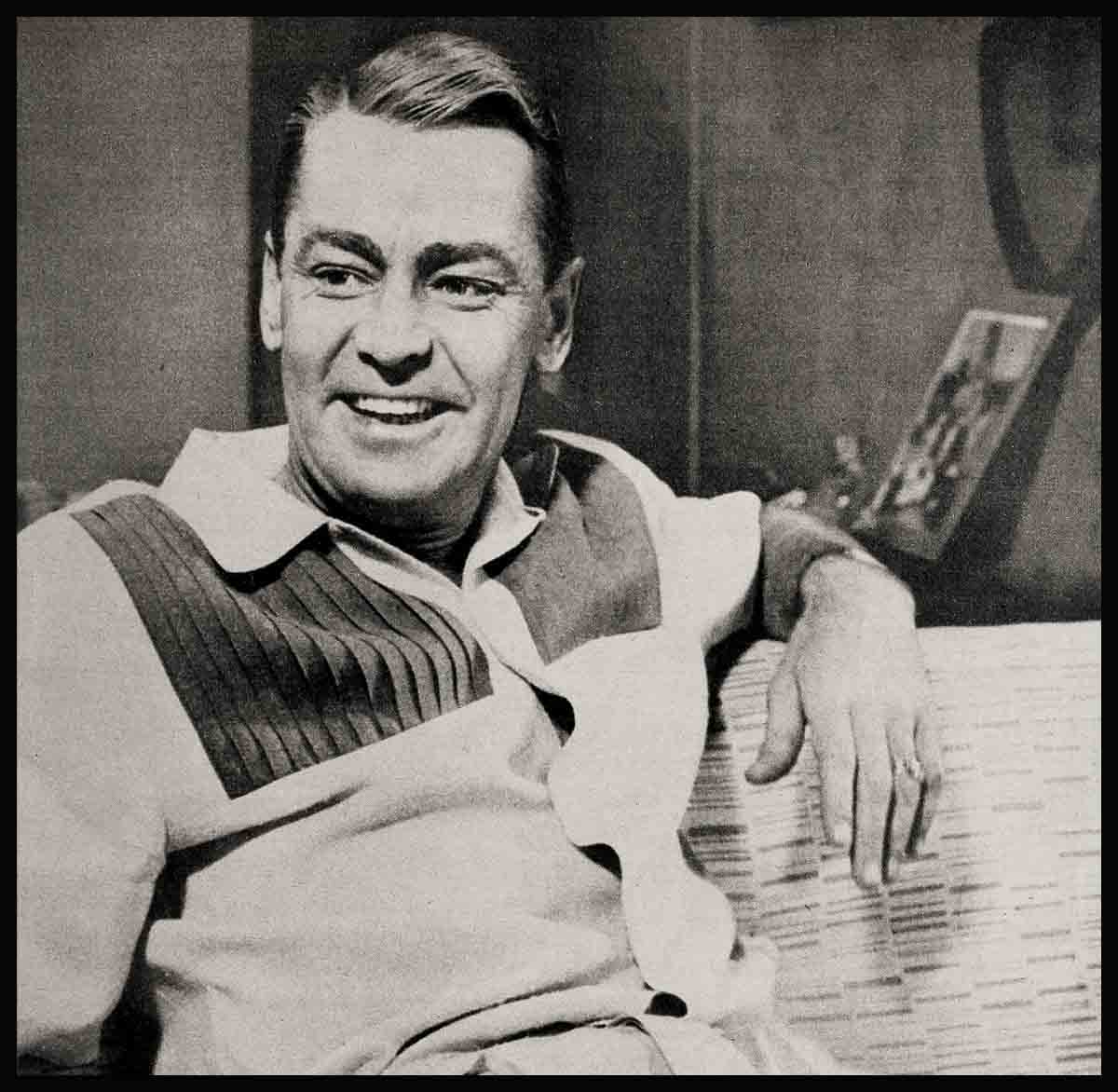
The Man With The Golden Touch—Alan Ladd
All the man wanted was a flashlight. Why should the inconspicuous sign, Higgins-Ladd Hardware, mean anything to an outstate tourist rolling through Palm Springs, California? But the store looked modern and inviting. And it was handy at a fork in the road.
Inside, a yellow-haired guy in faded blue cotton pants, desert sneakers and a T-shirt, who’d been sitting on the counter, hopped briskly off to help. But the phone rang and he said, “Excuse me a minute. We’re short handed today—manager’s sick. Look ’em over—I’ll be back . . . Yeah, Frank,” he addressed the receiver. “Sure we’ve got it. I’ll send it right over. Hundred feet of green plastic hose to Sinatra’s place,” he yelled to the back room. “Pronto! He needs it right away.”
As he returned, a big, boyish looking character with freckles and a mass of wheat colored hair ambled in. “Hi, Al. Where are the shovels?”
“In the back—I’ll be right with you, Van.”
The tourist perked up. “Isn’t that Van Johnson?” He got a nod before the phone rang again. This time he dropped his jaw at the conversation.
“We’ve just got six in stock, Greg,” declared the blond salesman. “But they’re the best—like Gable bought. No—no—don’t think of it. The boy’s out, but I’ll bring them right over myself . . . Everything happens at once around here,” he grinned apologetically to the tourist, who wasn’t listening.
“Look,” he said, “I suppose you’ll tell me that was Gregory Peck you talked to—and about Clark Gable?”
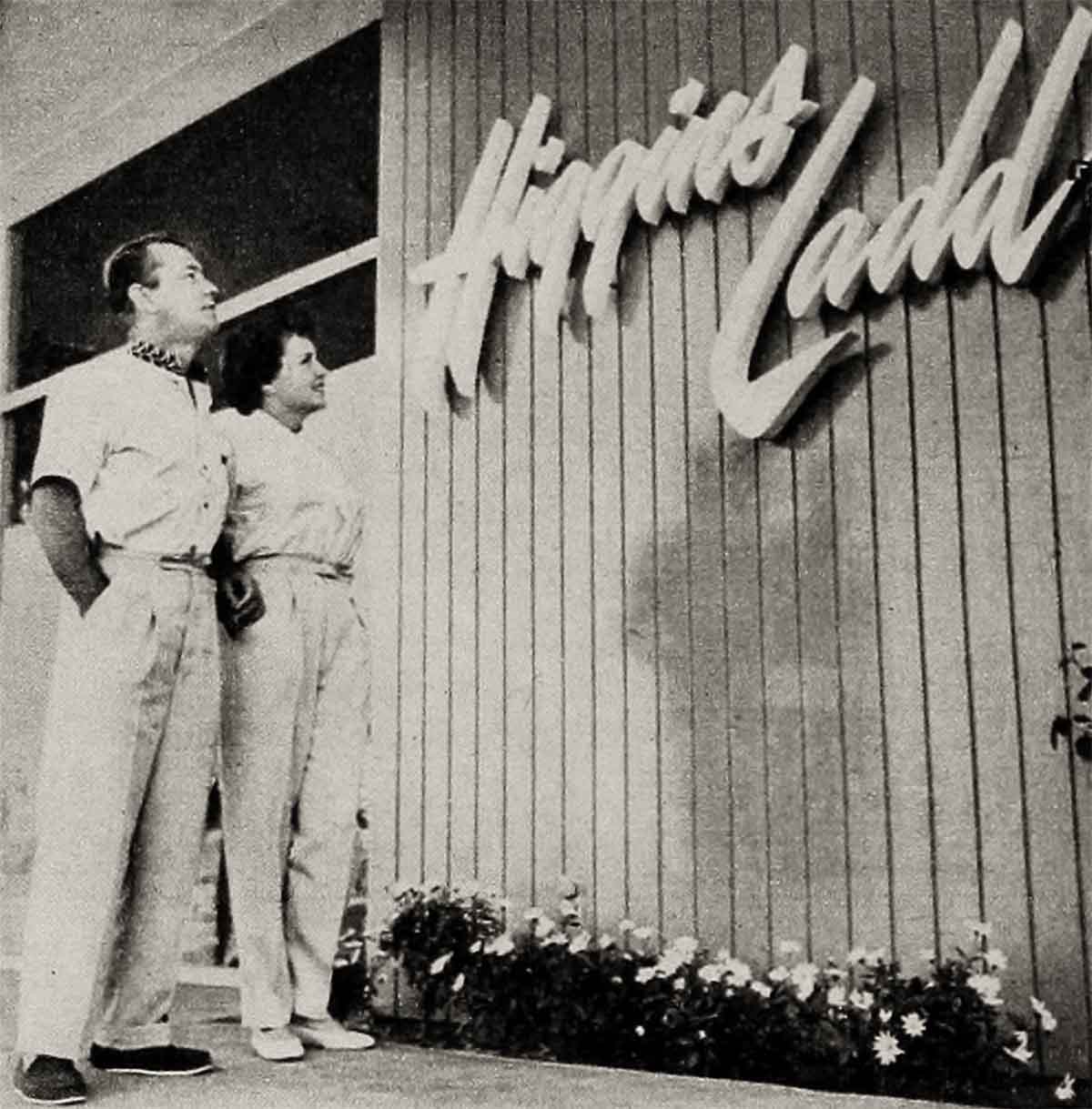
“That’s right.”
Things connected now, the store sign, the famous names, the familiar features. “Hey,” cried the customer, “I know you—you’re Alan Ladd, the movie actor! Say,” he blurted as Alan nodded, “can I ask you a personal question? Why the heck does a guy like you work in a hardware store?”
“I don’t know,” said Alan. “Because I’ve got to, I guess.”
That answer probably didn’t make sense to the baffled tourist, any more than it would to a lot of people who know Alan Ladd much better. They know that actually he doesn’t have to work another day in his life. If anyone has got it made in Hollywood, it’s Alan. Yet in another respect his was an absolutely honest reply: Alan can no more resist tackling something new than he can halt his breath.
Alan is a man with the golden touch. Recently he produced Cry In The Night for $300,000. It seems headed to return $3,000,000. Shortly before that he risked some important savings in ten oil wells. The first nine came in. All the stocks he bought several years ago have split and tripled in value. Both his twenty-five-acre Alsulana Ranch and his eleven-room Holmby Hills mansion (called “Ladd’s follies” when he bought them) are worth twice what he paid. He’s already had five bids for his new Palm Springs house, bought only last April, at a $50,000 profit. One offer came from Jack Benny, a notoriously tight man with a buck. By now Alan has a percentage interest in ten pictures assuring him a husky income for as many years ahead. Last year all in all, he collected over $1,000,000.
So, with no clouds whatever in his sky, these should be the vintage years for Alan Ladd—a time when he can coast a bit, relax and enjoy himself. But instead of sitting back and sampling the fruits of his labors, the eternally restless guy is sowing seeds for more every time he turns around. That new hardware store is as good an example as any.
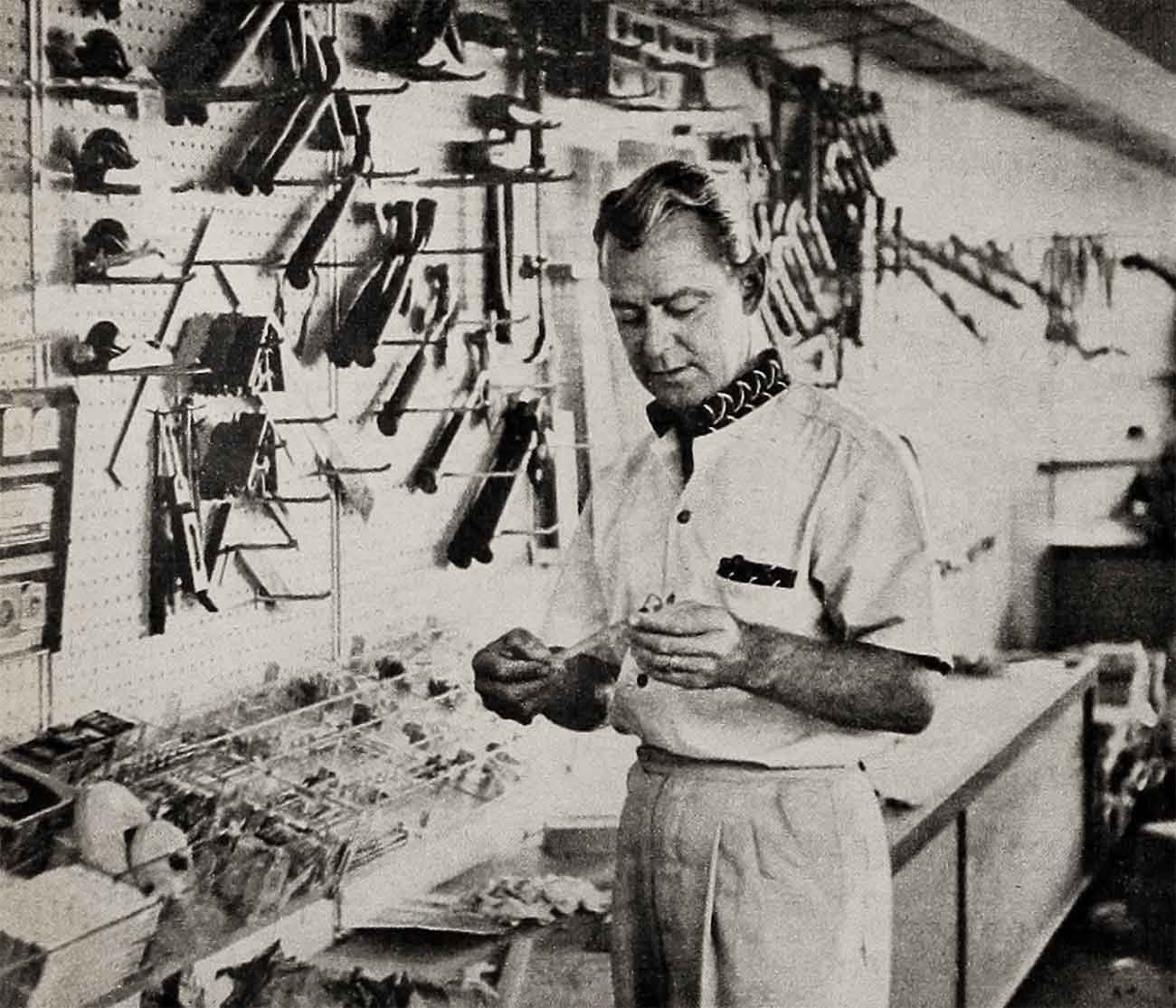
One sun-struck week
Alan drove down to Palm Springs with Sue one week end last April with nothing, he said, on his mind but some sun. One week later he and Sue had bought a house and moved into it.
They started out with one chair, a borrowed bed and a TV set—because once Alan tackles something he’s at it like a terrier. By Fourth of July the pool was mirroring the blue sky, complete with palm trees waving overhead. Inside, Sue’s beige and black Chinese modern decor was cool and comfy despite a 110 reading outside. And Alan Ladd was already started in the hardware business.
He ran into Bob Higgins when he built on a wing for the kids and looked up the contractor who had put up the house. The minute they met they started pounding each other’s backs. The big red-headed Irishman turned out to be a fan of Alan’s from away back—before he’d ever made a movie. Bob was a class below Al at North Hollywood High when Alan was the big operator there. Naturally Bob got the job, and in the process there was some trouble getting the right hardware.
“Trouble is there’s just one hardware store in town,” Bob complained. “No competition.”
“Why don’t we give him some?” asked Alan. That minute Higgins-Ladd Hardware got going. Land was leased from the Indian reservation and a smart new building went up. Today it’s filled with the classiest hardware stock in any store anywhere, including a deluxe toy department installed by Sue. Jack Benny, Clark Gable, Van Johnson, Bing Crosby, Frank Sinatra—a who’s who of Hollywood—are charge customers. Last Christmas Lucille Ball shopped for all her presents there, checking off a list two feet long. Greg Peck bought $700 worth of kitchenware for Veronique to use in their new home. Alan and Bob have a staff of four and around $125,000 tied up in the place. By now Alan’s a member of the Palm Springs Chamber of Commerce, and one town faction is planning to run him for mayor!
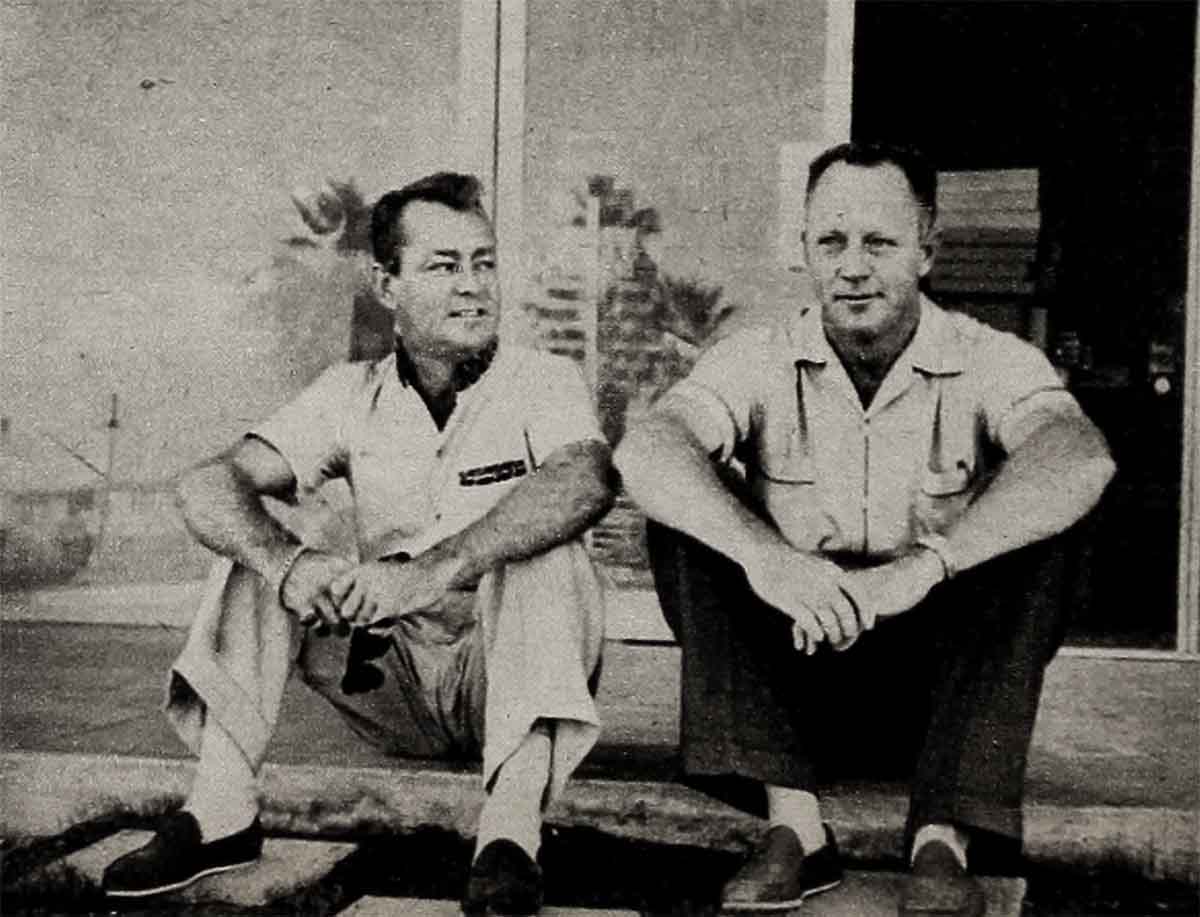
“And I brought him down here to rest!” sighs Sue.
The one “folly” Alan has gone after with dubious success is breeding race horses. But he’s still trying. Alan bought an Irish brood mare on his trip to Europe three years ago and had her flown across the Atlantic to the ranch to improve the blood line, which so far, hasn’t been spectacular. The one time a Ladd horse nosed first under the wire at Hollywood Park Alan was so excited that the picture he snapped turned out to be a shot of the floor! But that triumph was enough to keep him determined to eventually produce a Nashua. or a Swaps.
A guy like that has to believe he’ll win, or he won’t. Optimism, confidence and the guts to make decisions fast are marks of any champion. Alan has always acted on trigger-quick impulses. His new Palm Springs house and Higgins-Ladd Hardware were decisions made in minutes. So was his most prized possession today, Alsulana Acres, the first land he ever owned, and still the symbol of first success.
Alan first saw it when he rode out with an antique dealer friend to help deliver a sofa at another Hidden Valley ranch. After he’d helped lift it off the truck and lug it inside, he stepped out on the porch to get his breath and looked around the lovely mountain ringed valley. And suddenly he knew what he wanted. He stepped back inside and asked the woman who owned the house, “Do you know if there are any ranches for sale around here?”
She was so amused she had a hard time keeping a straight face. She thought he was a roustabout. Hidden Valley is the most expensive ranch land in Southern California. “There’s one over there,” she finally said, “but I’m afraid you couldn’t afford it.”
“Thanks,” he said. That week he bought it. Only afterward did he tell his new neighbor who he was.
One of Sue’s favorite stories is about Alan’s sudden impulses. At lunch one day, awhile back, she mentioned her long cherished dream to visit Hawaii. Alan merely grunted something about how busy he was and how he couldn’t afford it. That afternoon he went down town a on business.” At dinner he asked, “Haven’t you started packing yet?”
“For what?” she asked him puzzledly.
“Hawaii, of course,” he said, handing her a packet of tickets. He’d made reservations for two days later. And two days later they sailed—the whole family.
Although he pretends to turn a casual, sometimes even curt face to the world, Alan is actually as sensitive as a seismograph to other people’s feelings and desires—whether they’re those of his own wife and children or the guy down at the gas station. This trait translates itself into deep reaching loyalties which influence whatever he does.
Each morning when Alan’s shooting, Hannah has a special chore—to prepare a full-course hot lunch for ten to fifteen and get it in the station wagon. At noon that’s how many of the Jaguar Productions crew have lunch with Alan in his dressing room. The guests are rotated each day.
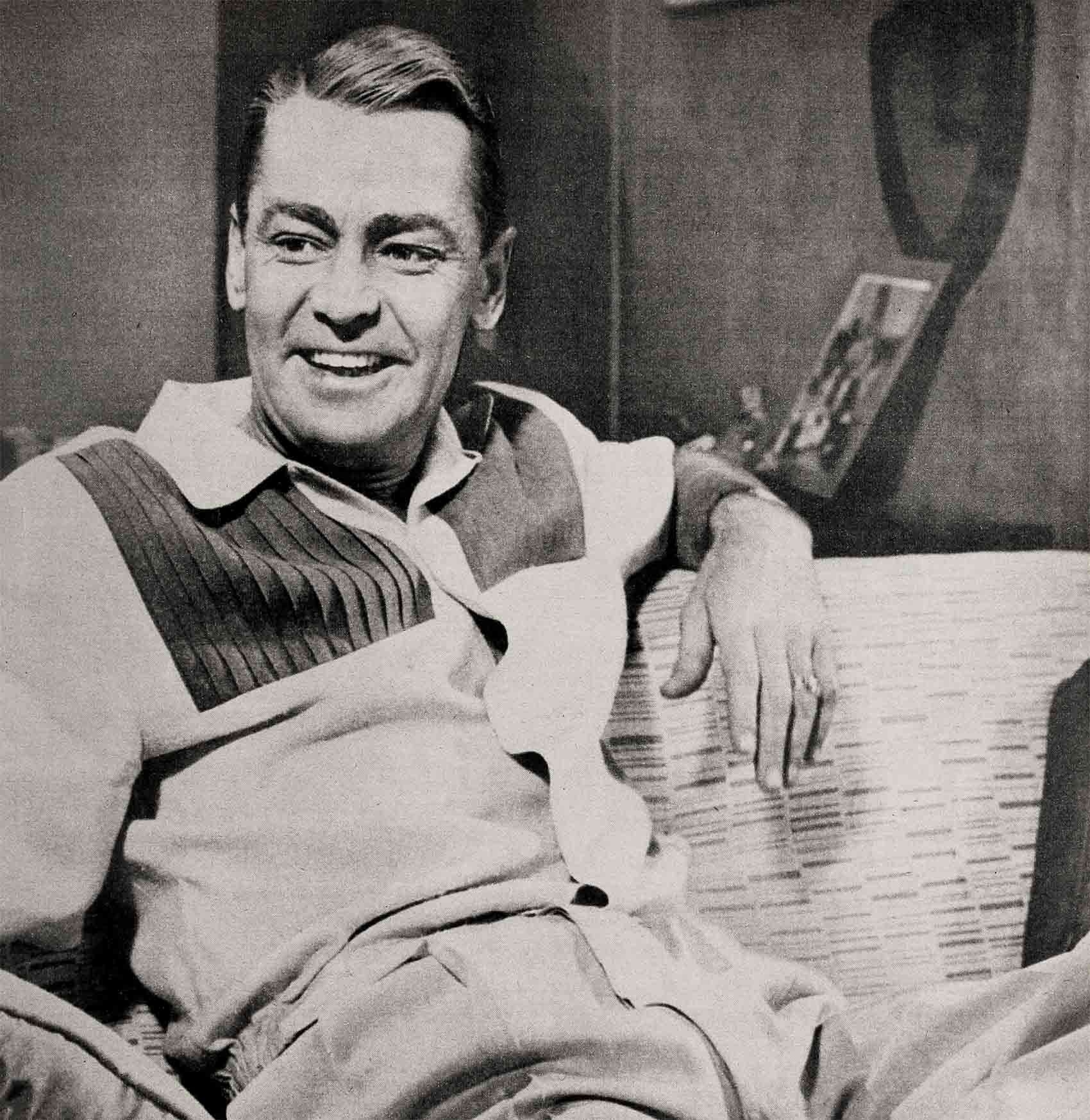
The other day Alan mentioned to Rudy, his Mexican gardner, that he liked tacos. “I’ll bet your wife makes tacos out of this world,” he ventured.
“Please—you will come to dinner?” invited Rudy, “and my wife, she will make them for you.” Alan said he’d be delighted. Van and Evie Johnson came down that week and Rudy invited them, too. All four had a wonderful evening at Rudy’s modest home in Palm Springs.
Alan spends $50,000 a year keeping in touch with his fans. The two secretaries who help him, Rosemary and Junie, were originally members of his fan club. Recently at the famous Scripps Clinic in La Jolla, California, the nurse who prepared him for the embarrassing ordeal of internal tests turned out to be a fan who had written him off and on for years. “You’ve always been my favorite actor, Mr. Ladd,” she said. “Turn over, please.”
Alan went to the clinic last spring to try to lick a troublesome sinus condition. He spent eight days there, and Sue went through the same examinations. At the end the doctors gave them both a perfect bill of health but so far haven’t determined what makes Al’s head clog up painfully at night. Allergy was suspected and he had tests for almost every known irritant, which Sue took, too.
“Alan wasn’t allergic to anything,” Sue laughs wryly, “I was allergic to everything.”
“Especially me,” he teases her. But that’s furthest of all from the truth.
No two people
There are no two people more sentimental about their marriage than Alan and Sue Ladd. Each year Alan and Sue celebrate two wedding anniversaries—the first for their original wedding in Tijuana, Mexico, and the second for the time they double-hitched it in Santa Ana, California, four months later on July 12—fourteen years ago.
The most recent one might have been their first, the way they acted. It was an all day contest between two people trying to outdo each other in making the day wonderful for the other one. Periodically Alan would. rush away on a lame excuse and be back with a new present. Then Sue would disappear on the same mission. Meanwhile the living room of their Palm Springs house took on the appearance of a hothouse. Flowers and telegrams kept the doorbell ringing and Lottie, the maid, scurrying for something to use for a vase. Each brought a reminiscence and the word repeated most often was “lucky.” That evening, after a toast in champagne, they went out to dinner and around town. At every stop a special chef’s tribute to a happily married couple miraculously appeared on the table. How everyone knew was a mystery to Alan and Sue. But why everyone cared is no mystery to anyone.
Alan and Sue Ladd are bound together not only by sentiment, and abiding love—but something else which would make any thought of retiring ridiculous for either one of them. Theirs is a working marriage in every real sense of that term. It started that way, and that’s the way it’s stayed.
The Ladd kids
Sue had a daughter when she married Alan. Alan had a son. Today, curiously, Carol Lee looks more like Alan than she does Sue. And Alan, Jr. resembles Sue more than he does Alan. When Alan sometimes grumbles that Laddie exhibits no burning get-up-and-go at eighteen, as he himself did, it’s Sue who points out. “Remember, Laddie hasn’t had to. He’s been raised in a different world.” On the other hand, Alan has always been Carol Lee’s special champion.
It was Alan who persuaded Carol Lee to major in Theatre Arts at UCLA, where she graduated two years ago cum laude.
Outside of his children Alan hasn’t a relative in the world. Sue has only some elderly aunts and scattered cousins. It may be an impossible dream—to have Ladd Enterprises carried on for another generation—but Alan dreams it. Already he has broken Laddie into a camera. It was only a bit in Santiago where Junior jumped from a tree into a fight scene. “But he got his Actor’s Guild card,” exults Pop. Dave is a little young but already looks like a future swoon, and it wouldn’t make his Dad mad if some day he wanted to be one for a living. As for Alana, already she’s getting restless.
The other afternoon Sue overheard a marathon phone session between Alana and a girl friend. The subject was young Bob Walker, Jennifier Jones’ son.
“I know he thinks I’m much too young for him,” confided Alana. “It’s true I’m only twelve. But mentally I’m at least fifteen!”
Well, her dad will be only forty-three, come next September 3. Just entering the ‘prime of life, it may seem a little previous for him to think about posterity at this point. He still is about as wiry and tough as he ever was. He weighs 140, only five pounds more than “Tiny” Ladd did in high school. He hasn’t any vices worth mentioning, outside of a tendency to try and fill an inside straight at poker.
So I guess, being Alan Ladd, he’ll never stop worrying about something and trying something new. Things will never get easier for him, because Alan just couldn’t stand them that way.
THE END
—BY JACK WADE
It is a quote. MODERN SCREEN MAGAZINE JULY 1956




